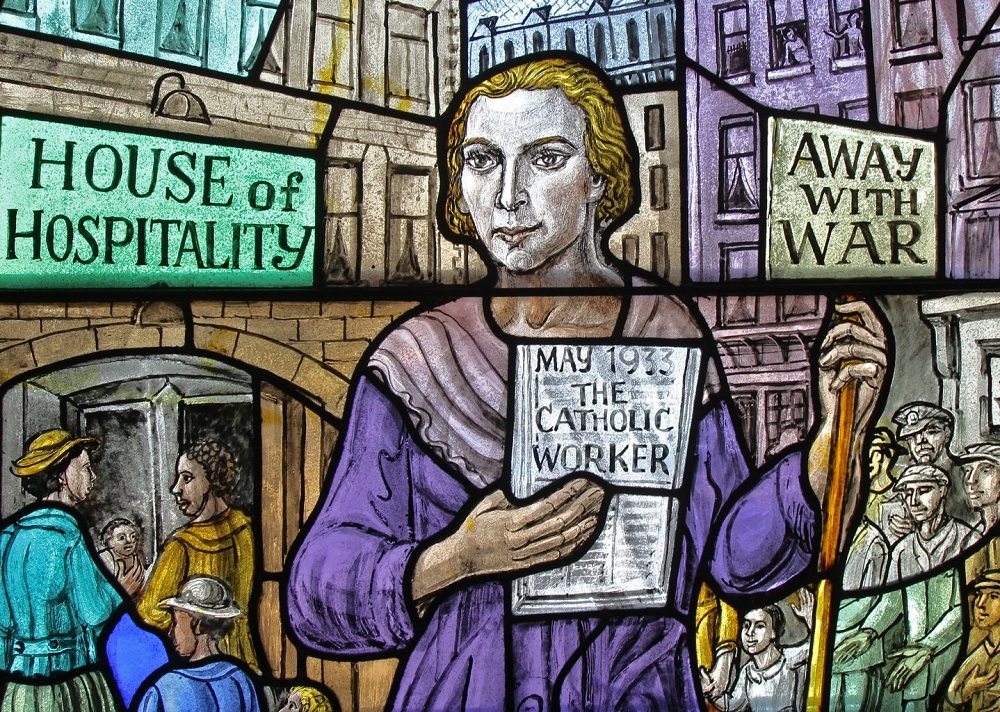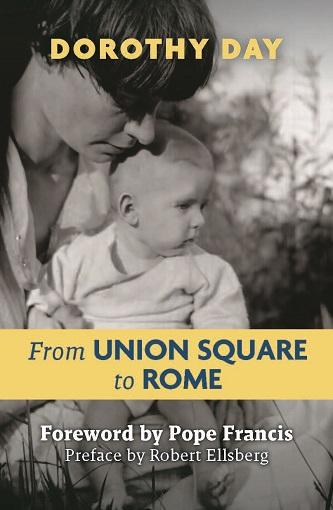
Dorothy Day, co-founder of the Catholic Worker Movement and its newspaper, The Catholic Worker, is depicted in a stained-glass window at Our Lady of Lourdes Church in the Staten Island borough of New York. (CNS/Gregory A. Shemitz)
Dorothy Day was "a great witness to faith, hope and charity in the 20th century," a woman who loved the Catholic Church despite the flaws of its members and who knew that serving God meant serving the poor and working for justice, Pope Francis wrote.
"The way in which Dorothy Day tells us how she became a Christian believer shows that people are not brought to God by human efforts or strategies, but by grace that springs from charity, witness that is beautiful and active love," the pope wrote in the foreword to a new edition of Day's 1938 memoir on her conversion, "From Union Square to Rome."
The edition, with the papal foreword, will be released in English by Orbis Books in 2024, but an Italian translation by the Vatican publishing house was released in late August.
Day, who lived 1897-1980 and was co-founder of the Catholic Worker Movement, became a Catholic in 1927. Her cause for sainthood officially opened in 2000, and Pope Francis included her as one of the four "great Americans" he spoke about when he addressed the U.S. Congress in 2015.
Advertisement
Robert Ellsberg, editor-in-chief of Orbis Books, mentioned that moment during a talk about Day at the Communion and Liberation movement's Meeting in Rimini, Italy, Aug. 20.
"That Pope Francis should highlight Dorothy Day was in many ways not surprising," he said. "It is hard to think of any other Catholic of recent times who so fully embodied his Gospel vision with its emphasis on mercy, his desire for a 'poor church for the poor,' his challenge to the culture of indifference and a market economy that 'kills,' his call to touch the wounds of Christ in those on the margins and peripheries, his deep commitment to peace and care for creation, his teachings on 'social friendship' and solidarity, and his strategy for change with a focus on the slow, patient task of planting seeds."
In the memoir, Day writes that she sought and found God "when I was most happy" and not, as detractors would say, in the midst of "fear of loneliness and solitude and pain."
Day was a "restless" woman and one who "teaches us that God is not simply a comfort or a form of alienation to turn to amid life's difficulties, but that he abundantly meets our yearning for joy and fulfillment," the pope wrote in the foreword. "The Lord comforts restless hearts, not bourgeois souls who are content with things as they are."
Day had a very realistic picture of the Catholic Church, the pope said. "To her the church frequently seemed to be on the side of the rich and the property owners, and often unaware of the need for real social justice and equality, which -- as she reminds us -- figure largely in so many pages of the Old Testament."
But she persisted in her search, he said, growing in her conviction of "the divine nature of the Catholic Church," even if many Catholics fell short of the Christian ideal.
Pope Francis quoted Day herself: "Nothing but a divine institution could have survived the betrayal of Judas, the denial of Peter, the sins of many of those who professed her faith, who were supposed to minister to her poor."
"How wonderful to hear such words from a great witness to faith, hope and charity in the 20th century, the century in which the church has often been criticized, hated and abandoned," he wrote.
Yet Day was convinced that "the church had directly to do with God, because it belonged to him, not to us. It was he who wanted it, not us. It was his instrument and not something we could make use of for ourselves," the pope said. "That is the church's vocation and identity, a divine reality, not a human one, which can lead us to God, and through which God can meet us."
Day's charity and struggle for justice came before her conversion, the pope noted. "Her work for others, as well as her work as a journalist and activist became a sort of 'highway' along which God touched her heart."
"She herself reminds the reader how the struggle for justice is one of the ways whereby, even unconsciously, everyone can fulfil God's desire for a reconciled humanity, and in which the sweet scent of love drives out the nauseating stink of selfishness," he wrote.








